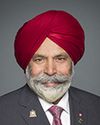I don't want to speak for Ms. Harder, but maybe one of the differences with police is trying to get some evidence about how this may impact their charging practices.
We heard a number of different ideas. They can come upon a scene as diverse as a drug trafficker or a crack house or a party. We heard some evidence from some of the witnesses that this may affect how the police will interpret their powers or how it may affect their investigative or other charging techniques. This is a valid area of investigation.
I think there is some cause to look into it, if it was the will of the committee.
I also agree with Mr. Oliver that if we're looking at it from the point of view of the victim, in a way the position of the police almost doesn't matter because we're trying to encourage the people at the scene to phone.







